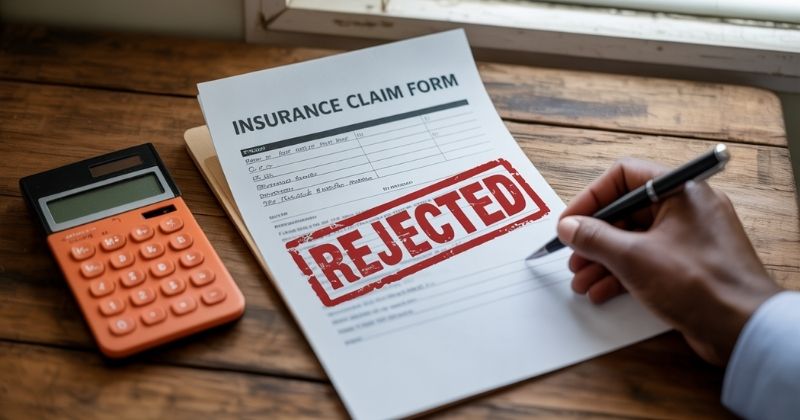
Receiving notice that your insurance claim has been declined can be frustrating and financially distressing, especially if you were counting on the payout to cover an emergency. In South Africa, claim rejections are governed by specific rules and legal frameworks that require insurers to give clear reasons for their decisions. Understanding the cause of the rejection is the first step in deciding whether the matter can be resolved, contested, or escalated.
Key Takeaways
- Understand Why Claims Are Rejected: Claims may be declined for reasons such as late submission, missing documents, policy exclusions, or insufficient cover. Reviewing the insurer’s explanation and your policy details is the first step in responding.
- Follow A Clear Dispute Process: If your claim is rejected, you can request written reasons, compile supporting documents, and lodge a formal complaint with the insurer. If unresolved, the issue can be taken to the relevant Ombudsman for further review.
- Work With An Experienced Broker: Insurance brokers help prevent claim rejections by ensuring proper cover, clarifying policy terms, and guiding you through the claims process to improve the outcome.
About Arcadia Finance
Apply for a loan the smart way with Arcadia Finance. No fees, just quick access to 19 NCR-compliant lenders offering options that suit your needs.
Why Your Claim May Have Been Rejected
Before anything else, you should understand the reason your insurance claim was declined. Once you are clear on the cause of the rejection, it becomes easier to see whether any further action is required or possible.
Typical reasons claims are declined may include:
- Insufficient Cover: Many people assume their policy includes a wide range of situations, but it may not provide for every possibility. In some cases, you might need to add optional benefits or take out an entirely different policy to be protected against certain events. If the event you are claiming for falls outside the scope of your policy, the claim will not be approved.
- Late Submission: Insurance contracts generally come with strict timelines for lodging a claim. If you fail to submit within the required period, the insurer may have grounds to refuse your request, regardless of the claim’s merit.
- Incomplete Documentation: Claims are assessed based on the documents provided. If you submit a claim without supporting evidence or required paperwork, the insurer is unlikely to process it. In such cases, the claim is often turned down due to a lack of information.
- Policy Exclusions: All insurance agreements contain exclusions; specific situations or conditions that are not covered under the policy. For example, if you were driving while intoxicated at the time of a vehicle accident, your insurer is likely to reject the claim based on that exclusion.

Steps To Handle An Insurance Claim Rejection In South Africa
| Step | Description |
|---|---|
| Step 1: Understanding the Reason for Rejection | Begin by identifying the specific reason your insurance claim was declined. Insurance companies in South Africa must comply with the Short-term Insurance Act 53 of 1998 and the Long-term Insurance Act 52 of 1998, which require them to give policyholders clear and detailed reasons for rejecting a claim. The Policyholder Protection Rules (PPR) also require insurers to communicate decisions openly and to treat customers fairly at all stages. |
| Step 2: Reviewing the Terms of Your Insurance Policy | Take the time to read through your insurance documents in full. Claims are often rejected due to clauses, exclusions, or specific conditions that are stated in the policy. According to the principle of caveat subscriptor, confirmed in George v Fairmead (Pty) Ltd 1958 (2) SA 465 (A), you are legally bound by the contents of a contract you sign, whether or not you have read it. Understanding these terms is necessary to judge whether the claim rejection was correct. |
| Step 3: Requesting a Detailed Written Explanation | If the insurer’s explanation is vague or incomplete, ask them to provide a detailed response in writing. Under Section 5 of the Promotion of Administrative Justice Act 3 of 2000 (PAJA), you have the legal right to request written reasons for any administrative action that negatively affects your rights. Taking this step is especially useful when trying to clarify and challenge the decision made on your insurance claim. |
| Step 4: Compiling Supporting Documentation | Collect all documents and information that back up your claim. This could include photographs, receipts, professional assessments, or witness accounts. In the case of Mutual & Federal Insurance Co Ltd v Oudtshoorn Municipality 1985 (1) SA 419 (A), the court confirmed the importance of having strong evidence when submitting an insurance claim. Providing detailed support for your claim may help improve your chances of success. |
| Step 5: Submitting a Formal Complaint to the Insurer | Send a formal complaint to the insurer’s internal complaints division. According to the Financial Advisory and Intermediary Services Act 37 of 2002 (FAIS Act), all insurers must have a proper complaints resolution process in place. Your complaint should be well-written, include all relevant documents, and provide a full account of the events leading up to the claim and its rejection. |
| Step 6: Taking the Matter to the Relevant Ombudsman | If you are not satisfied with the insurer’s response, you may escalate the matter to the appropriate Ombudsman: • Ombudsman for Short-Term Insurance (OSTI) • Ombudsman for Long-Term Insurance (OLTI) These offices offer consumers a free and independent dispute resolution service. They assess cases based on fairness and legal standards, as outlined in the Ombud for Financial Services Providers Act 37 of 2004. |
| Step 7: Considering Legal Proceedings | If none of the above steps lead to a resolution, you might need to pursue legal action. Speak to a qualified legal professional to evaluate whether it is worth taking the matter to court. In Jerrier v Outsurance Insurance Company Ltd 2015 (5) SA 433 (KZP), the court looked at the duties of insurers and the rights of policyholders, helping to clarify how these disputes should be handled in a legal setting. |
| Step 8: Exploring Alternative Dispute Resolution | Mediation or arbitration may offer a quicker and more cost-effective way to resolve the issue. These methods are less formal than court proceedings and are often more flexible. They give both sides the chance to reach an agreement without going through lengthy litigation. |
| Step 9: Upholding Your Rights as a Policyholder | Make sure you understand your rights under the Policyholder Protection Rules (PPR). Insurers are required to handle claims promptly, provide clear information, and treat all customers fairly throughout the process. If these standards are not met, you have every right to escalate your complaint or seek external help. |

How Expert Insurance Brokers Help Reduce Claim Rejections
Insurance claims can be stressful, especially when the unexpected occurs and there is uncertainty about why a claim has been turned down. This is where the value of working with an insurance broker becomes clear, as they play a vital role in improving the overall experience and outcome of your insurance journey.
Brokers simplify policy information by explaining the terms and conditions in language that is easier to understand. Since your insurance needs are specific to your circumstances, proper protection requires a personalised policy or specialised cover. A broker helps ensure that there are no critical gaps in your cover, especially for the areas that are most important to you.
An experienced broker can negotiate both premiums and benefits that are aligned with your actual needs, which often results in cost savings over time. Brokers also have a strong understanding of the claims process and the documentation required, which allows them to offer accurate advice and guidance to help you achieve the best possible claim outcome more quickly.
As your life progresses, your insurance requirements also shift. A broker will regularly assess your policy and recommend updates so that your cover stays suitable for your changing circumstances.

Tips To Avoid Having Your Insurance Claim Rejected

Always Provide Accurate And Honest Information
When filling in your insurance claim or application, provide truthful and accurate information. If there are any errors or misleading details, this could result in your claim being denied and may even lead to legal consequences for fraud. To strengthen your claim, consider including supporting documents such as affidavits or photographs.

Only Cover Assets That You Own Or Use
Insurance policies typically only apply to items or assets that legally belong to you. For example, some parents insure their child’s car under their own name to reduce costs. However, many insurers prefer that adult children who earn their own income take out their own policies. While this may require more admin, having separate policies avoids complications during the claims process. If your child drives your vehicle and isn’t financially independent, ensure they are listed as an authorised driver on your policy.

Follow Road Rules And Keep Your Vehicle Legal
Ensure your driving licence is valid, and that anyone who uses your car has a valid licence. An accident involving an unlicensed driver can result in your claim being declined. Also, check that your car is roadworthy, as issues like worn tyres or faulty lights can affect your cover. Driving while under the influence of alcohol or narcotics will almost always invalidate your claim.

Take Reasonable Steps To Prevent Loss Or Damage
Avoid carelessness that could put your belongings at risk. For example, don’t leave keys in your vehicle or forget to arm your home alarm. Installing a tracking device and keeping proof of it can also help support a claim if your car is stolen.

Keep Your Insurance Payments Up To Date
If your monthly premiums are unpaid, your policy may be cancelled or suspended, making you ineligible to claim. If you’re struggling to keep up with payments, contact your insurer to discuss alternative arrangements rather than missing payments altogether.

Understand Waiting Periods On Your Policy
Most insurance policies have waiting periods before certain benefits become active. If you submit a claim during this period, it will likely be declined. Always check how long these waiting times apply to specific benefits.

Review Policy Exclusions And Terms Carefully
All insurance policies include specific exclusions within their terms and conditions. For instance, life cover might exclude pre-existing medical conditions. Read through your policy in detail to confirm you’re adequately covered and that there are no surprises when you need to claim.
Conclusion
Handling a rejected insurance claim in South Africa requires a clear understanding of your policy, awareness of your rights, and a structured approach to dispute resolution. Whether the rejection stems from exclusions, missing documents, or unclear terms, taking informed steps such as requesting written reasons, compiling strong evidence, and lodging formal complaints can improve your chances of a successful outcome. If all else fails, the Ombudsman or legal advice may offer further support. For many, working with a knowledgeable insurance broker can help prevent such situations by ensuring appropriate cover and assisting throughout the claims process.
Frequently Asked Questions
Begin by carefully reviewing the reason provided by your insurer for the rejection. Understanding the exact cause will help you decide whether to dispute the decision and what steps to take next. If the explanation is vague, you have the right to request a more detailed written response.
Yes, you are entitled to challenge the insurer’s decision. Start by submitting a formal written complaint directly to the insurer’s complaints department. If you are not satisfied with their response, you can then refer the matter to the relevant Ombudsman for further review.
Most insurance policies include a set time limit, often around 30 days, for submitting a claim after the insured event occurs. If you submit the claim after this deadline, the insurer may reject it, even if the claim itself is valid.
If your complaint remains unresolved after dealing with the insurer, you can escalate the matter to either the Ombudsman for Short-Term Insurance or the Ombudsman for Long-Term Insurance, depending on your type of cover. These independent bodies offer free assistance to policyholders.
An experienced broker can review your policy to ensure it meets your needs, explain policy wording in plain language, assist with gathering the right documentation, and guide you through the claims process. This reduces the chances of rejection and helps ensure your claim is handled correctly from the start.
Fast, uncomplicated, and trustworthy loan comparisons
At Arcadia Finance, you can compare loan offers from multiple lenders with no obligation and free of charge. Get a clear overview of your options and choose the best deal for you.
Fill out our form today to easily compare interest rates from 19 banks and find the right loan for you.

